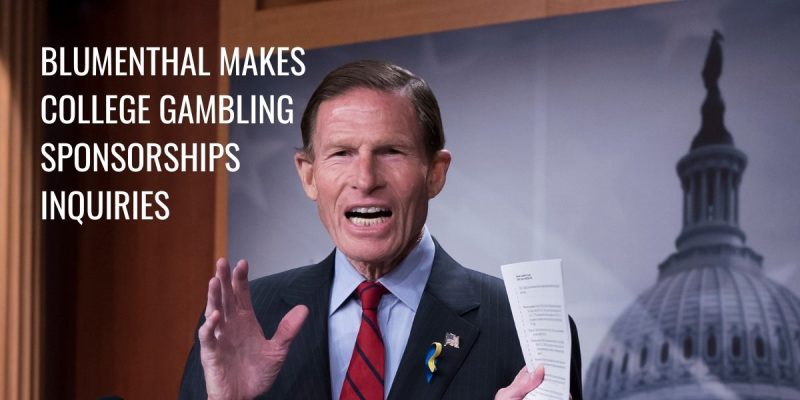US Sen. Richard Blumenthal (D-Conn.) has been among the most active members of the body on issues related to the college sports industry. Most recently, that activism has included inquiring with over 60 colleges and universities in the United States about their policies regarding US gambling sponsorships.
Blumenthal sent a letter to numerous institutions also asking about the resources they provide for students who struggle with pathological gambling issues. While Sen. Blumenthal wants clear, direct answers within a short timeframe, the responses might disappoint him.
Sen. Richard Blumenthal inquires about US gambling partnerships
Blumenthal distributed his Monday letter to academic administrators at 66 colleges or universities in the US. The letter refers to reports of partnerships between some of those institutions and gambling companies.
Among the issues that Blumenthal mentions in the letter is that “universities with these partnerships have done little to set up the necessary support for students who develop a gambling addiction.” Blumenthal states he believes the institutions’ foremost priority should be protecting student health as “certain factors … make students especially vulnerable to gambling addiction.”
Because of his concerns, Blumenthal seeks several pieces of information from the administrators. He adds that he would like to receive responses to his questions by Apr. 27. His inquiry is comprehensive.
Putting the onus on colleges and universities
Blumenthal’s inquiry consists of six overarching questions. The first two of those questions include multiple facets, however. For example, the senator wants to know the specific terms of any gambling partnerships the institutions currently have. Additionally, he wants to know how institutions with such partnerships in place will use the sponsorship dollars.
In his second question, he asks for copies of correspondence between colleges/universities and gambling companies. The second question also leads to the responsibility that Blumenthal believes the institutions have for their student bodies.
Blumenthal directly poses the question of how colleges/universities “protect students from engaging in risky financial behaviors.” The senator then extends that idea in the next question, asking how the institutions prevent people who are below the legal gambling ages in their states from playing.
He continues by asking about how colleges/universities provide support services for students with compulsive gambling issues. Finally, he asks whether institutions that currently do not have gambling partnerships will commit to abstaining from forming such deals.
Blumenthal hasn’t been the only party taking action on this issue recently, however. Gambling interests themselves along with state-level legislators are also getting involved.
Possible state-level restrictions
Several states are considering restrictions on sportsbooks promoting themselves in connection to colleges and their campuses.
- A bill to legalize sports betting in Vermont would ban sportsbook advertisements on college campuses
- Connecticut’s legislature is considering banning institutions from marketing sports betting to students
- Referral payments to institutions for new sportsbook customer signups would be illegal under a Maryland bill
Furthermore, the American Gaming Association (AGA) announced updates to its Responsible Marketing Code for Sports Wagering on Tuesday. The AGA is a trade group for gambling companies in the US.
The AGA’s code now prohibits “college partnerships that promote, market, or advertise sports wagering activity” outside of such sponsorships that focus on “alumni networks or content focused on responsible gaming initiatives or problem gambling awareness.”
While the AGA has no authority to enforce its code, non-compliance could harm members’ standing. Blumenthal’s letter also lacks any actual enforcement methods.
Will colleges and gambling companies comply with requests?
Blumenthal’s letter makes it clear that his inquiry is merely a request. While some of the information that he is seeking could be subject to public records statutes, the senator wants the institutions to supply the information voluntarily.
The colleges and universities might not respond, at least not to every part of the letter, for various reasons. Among them is a potential negative public reaction to details of how colleges/universities are failing to provide for students with pathological gambling issues.
Furthermore, several members of the AGA currently have partnerships in place that are outside the updated code. It’s unclear whether they would be willing to discontinue those sponsorships to meet the new terms.
Failing to make some effort to abide by these recommendations could eventually have consequences, though. Such decisions could inspire state legislators to enact more of the aforementioned restrictions. If the colleges/universities and gambling companies don’t regulate themselves in this regard, Blumenthal’s letter is a sign that government bodies could do it for them soon.








